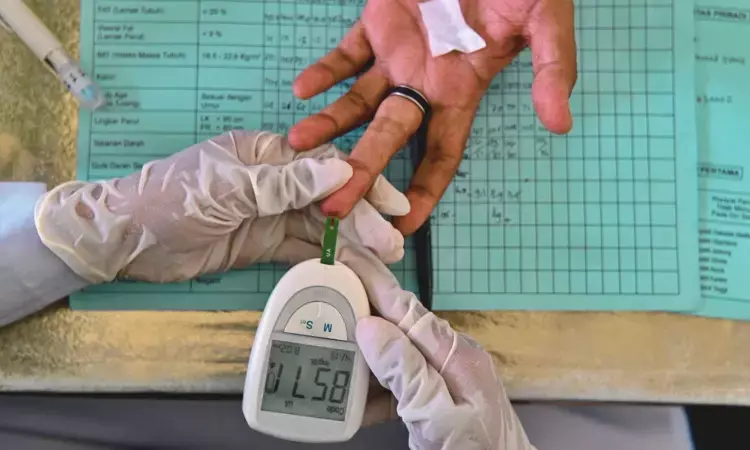- Home
- Medical news & Guidelines
- Anesthesiology
- Cardiology and CTVS
- Critical Care
- Dentistry
- Dermatology
- Diabetes and Endocrinology
- ENT
- Gastroenterology
- Medicine
- Nephrology
- Neurology
- Obstretics-Gynaecology
- Oncology
- Ophthalmology
- Orthopaedics
- Pediatrics-Neonatology
- Psychiatry
- Pulmonology
- Radiology
- Surgery
- Urology
- Laboratory Medicine
- Diet
- Nursing
- Paramedical
- Physiotherapy
- Health news
- Fact Check
- Bone Health Fact Check
- Brain Health Fact Check
- Cancer Related Fact Check
- Child Care Fact Check
- Dental and oral health fact check
- Diabetes and metabolic health fact check
- Diet and Nutrition Fact Check
- Eye and ENT Care Fact Check
- Fitness fact check
- Gut health fact check
- Heart health fact check
- Kidney health fact check
- Medical education fact check
- Men's health fact check
- Respiratory fact check
- Skin and hair care fact check
- Vaccine and Immunization fact check
- Women's health fact check
- AYUSH
- State News
- Andaman and Nicobar Islands
- Andhra Pradesh
- Arunachal Pradesh
- Assam
- Bihar
- Chandigarh
- Chattisgarh
- Dadra and Nagar Haveli
- Daman and Diu
- Delhi
- Goa
- Gujarat
- Haryana
- Himachal Pradesh
- Jammu & Kashmir
- Jharkhand
- Karnataka
- Kerala
- Ladakh
- Lakshadweep
- Madhya Pradesh
- Maharashtra
- Manipur
- Meghalaya
- Mizoram
- Nagaland
- Odisha
- Puducherry
- Punjab
- Rajasthan
- Sikkim
- Tamil Nadu
- Telangana
- Tripura
- Uttar Pradesh
- Uttrakhand
- West Bengal
- Medical Education
- Industry
SGLT2 Inhibitors Show Promise for Diabetes and Fatty Liver Disease: Study

Researchers have found in a new research that SGLT2 inhibitors may provide dual benefits in treating both diabetes and fatty liver disease. However, long-term studies with liver histology as a primary focus are needed to validate these effects.
Nonalcoholic fatty liver disease (NAFLD) is a common comorbidity in individuals with type 2 diabetes mellitus (T2DM), contributing to increased liver-related complications and cardiovascular risk.
Sodium-glucose cotransporter 2 (SGLT2) inhibitors have emerged as potential treatments offering benefits for both metabolic and liver-related outcomes. This systematic review evaluated the efficacy of SGLT2 inhibitors in improving hepatic steatosis, liver enzymes, glycemic control, and liver histology in patients with T2DM and NAFLD. The review was conducted using a structured methodology, including systematic database searches and risk of bias assessments.
Included randomized controlled trials (RCTs) investigated various SGLT2 inhibitors, such as dapagliflozin, empagliflozin, ertugliflozin, and ipragliflozin. Most studies showed significant reductions in liver fat content, improvements in serum liver enzymes (alanine aminotransferase (ALT), aspartate aminotransferase (AST), gamma-glutamyl transferase (GGT)), and favorable effects on blood pressure, triglycerides, and body composition. Glycemic control markers, including glycated hemoglobin (HbA1c), fasting glucose, and insulin resistance indices, also improved. One biopsy-based study demonstrated histological improvements, including reduced fibrosis and resolution of nonalcoholic steatohepatitis (NASH). No serious adverse events were reported.
These findings suggest SGLT2 inhibitors may offer dual benefits for managing both diabetes and fatty liver disease. Further long-term studies focusing on liver histology as a primary endpoint are needed to confirm these effects.
Reference:
Ahmed, Anas E., et al. "Efficacy of Sodium-Glucose Cotransporter 2 Inhibitors in Patients With Type 2 Diabetes Mellitus and Nonalcoholic Fatty Liver Disease: a Systematic Review of Randomized Controlled Trials." Cureus, vol. 17, no. 6, 2025, pp. E86232.
Dr. Shravani Dali has completed her BDS from Pravara institute of medical sciences, loni. Following which she extensively worked in the healthcare sector for 2+ years. She has been actively involved in writing blogs in field of health and wellness. Currently she is pursuing her Masters of public health-health administration from Tata institute of social sciences. She can be contacted at editorial@medicaldialogues.in.
Dr Kamal Kant Kohli-MBBS, DTCD- a chest specialist with more than 30 years of practice and a flair for writing clinical articles, Dr Kamal Kant Kohli joined Medical Dialogues as a Chief Editor of Medical News. Besides writing articles, as an editor, he proofreads and verifies all the medical content published on Medical Dialogues including those coming from journals, studies,medical conferences,guidelines etc. Email: drkohli@medicaldialogues.in. Contact no. 011-43720751


